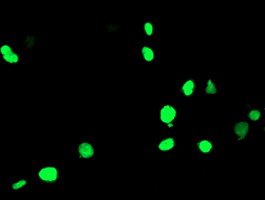PPAR alpha (PPARA) Mouse Monoclonal Antibody [Clone ID: OTI1E8]
CAT#: CF503540
Carrier-free (BSA/glycerol-free) PPARA mouse monoclonal antibody, clone OTI1E8 (formerly 1E8)
Formulation: Standard
Specifications
| Product Data | |
| Clone Name | OTI1E8 |
| Applications | IF, WB |
| Recommended Dilution | WB 1:200~500, IF 1:100 |
| Reactivities | Human, Mouse, Rat |
| Host | Mouse |
| Isotype | IgG1 |
| Clonality | Monoclonal |
| Immunogen | Human recombinant protein fragment corresponding to amino acids 145-420 of human PPARA(NP_005027) produced in E.coli. |
| Formulation | Lyophilized powder (original buffer 1X PBS, pH 7.3, 8% trehalose) |
| Reconstitution Method | For reconstitution, we recommend adding 100uL distilled water to a final antibody concentration of about 1 mg/mL. To use this carrier-free antibody for conjugation experiment, we strongly recommend performing another round of desalting process. (OriGene recommends Zeba Spin Desalting Columns, 7KMWCO from Thermo Scientific) |
| Purification | Purified from mouse ascites fluids or tissue culture supernatant by affinity chromatography (protein A/G) |
| Conjugation | Unconjugated |
| Storage | Store at -20°C as received. |
| Stability | Stable for 12 months from date of receipt. |
| Predicted Protein Size | 52 kDa |
| Gene Name | peroxisome proliferator activated receptor alpha |
| Database Link | |
| Background | Peroxisome proliferators include hypolipidemic drugs, herbicides, leukotriene antagonists, and plasticizers; this term arises because they induce an increase in the size and number of peroxisomes. Peroxisomes are subcellular organelles found in plants and animals that contain enzymes for respiration and for cholesterol and lipid metabolism. The action of peroxisome proliferators is thought to be mediated via specific receptors, called PPARs, which belong to the steroid hormone receptor superfamily. PPARs affect the expression of target genes involved in cell proliferation, cell differentiation and in immune and inflammation responses. Three closely related subtypes (alpha, beta/delta, and gamma) have been identified. This gene encodes the subtype PPAR-alpha, which is a nuclear transcription factor. Multiple alternatively spliced transcript variants have been described for this gene, although the full-length nature of only two has been determined. [provided by RefSeq] |
| Synonyms | hPPAR; NR1C1; PPAR; PPAR-alpha; PPARalpha |
| Reference Data | |
| Protein Families | Druggable Genome, Nuclear Hormone Receptor, Transcription Factors |
| Protein Pathways | Adipocytokine signaling pathway, PPAR signaling pathway |
Documents
| Product Manuals |
| FAQs |
| SDS |
Resources
| Antibody Resources |
Other Versions
| SKU | Description | Size | Price |
|---|---|---|---|
| TA503540 | PPARA (PPAR alpha) mouse monoclonal antibody, clone OTI1E8 (formerly 1E8) |
USD 447.00 |
|
| TA503540AM | PPARA (PPAR alpha) mouse monoclonal antibody, clone OTI1E8 (formerly 1E8), Biotinylated |
USD 509.00 |
|
| TA503540BM | PPARA (PPAR alpha) mouse monoclonal antibody, clone OTI1E8 (formerly 1E8), HRP conjugated |
USD 509.00 |
|
| TA503540S | PPARA (PPAR alpha) mouse monoclonal antibody, clone OTI1E8 (formerly 1E8) |
USD 200.00 |
{0} Product Review(s)
Be the first one to submit a review






























































































































































































































































 Germany
Germany
 Japan
Japan
 United Kingdom
United Kingdom
 China
China






